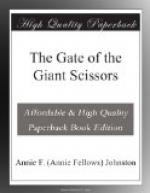Then they played that he was the prince, Prince Ethelried, and that the goats in the carriage-house were his royal steeds, and that Joyce was a queen whom he had come to visit.
[Illustration: A lesson in patriotism.]
But it came to an end, as all beautiful things must do. The bells in the village rang four, and Prince Ethelried started up as Cinderella must have done when the pumpkin coach disappeared. He was no longer a king’s son; he was only Jules, the little goatherd, who must hurry back to the field before the coming of Brossard.
Joyce went with him to the carriage-house. Together they swung open the great door. Then an exclamation of dismay fell from Joyce’s lips. All over the floor were scattered scraps of leather and cloth and hair, the kind used in upholstering. The goats had whiled away the hours of their imprisonment by chewing up the cushions of the pony cart.
Jules turned pale with fright. Knowing so little of the world, he judged all grown people by his knowledge of Henri and Brossard. “Oh, what will they do to us?” he gasped.
“Nothing at all,” answered Joyce, bravely, although her heart beat twice as fast as usual as monsieur’s accusing face rose up before her.
“It was all my fault,” said Jules, ready to cry. “What must I do?” Joyce saw his distress, and with quick womanly tact recognized her duty as hostess. It would never do to let this, his first Thanksgiving Day, be clouded by a single unhappy remembrance. She would pretend that it was a part of their last game; so she waved her hand, and said, in a theatrical voice, “You forget, Prince Ethelried, that in the castle of Irmingarde she rules supreme. If it is the pleasure of your royal steeds to feed upon cushions they shall not be denied, even though they choose my own coach pillows, of gold-cloth and velour.”
“But what if Gabriel should tell Brossard?” questioned Jules, his teeth almost chattering at the mere thought.
“Oh, never mind, Jules,” she answered, laughingly. “Don’t worry about a little thing like that. I’ll make it all right with madame as soon as she gets home.”
Jules, with utmost faith in Joyce’s power to do anything that she might undertake, drew a long breath of relief. Half a dozen times between the gate and the lane that led into the Ciseaux field, he turned around to wave his old cap in answer to the hopeful flutter of her little white handkerchief; but when he was out of sight she went back to the carriage-house and looked at the wreck of the cushions with a sinking heart. After that second look, she was not so sure of making it all right with madame.
Going slowly up to her room, she curled up in the window-seat to wait for the sound of the carriage wheels. The blue parrots on the wall-paper sat in their blue hoops in straight rows from floor to ceiling, and hung all their dismal heads. It seemed to Joyce as if there were thousands of them, and that each one was more unhappy than any of the others. The blue roses on the bed-curtains, that had been in such gay blossom a few hours before, looked ugly and unnatural now.




